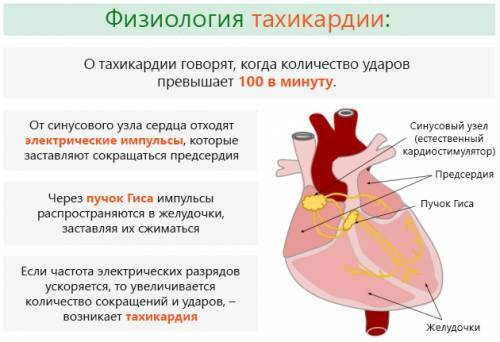The widely known PMS has a lot of unpleasant symptoms that disrupt the habitual life expectancy. However, any changes in the work of the heart in the people are considered dangerous, and women who have a heartbeat before the onset of "these days" often turn to a doctor. Is the tachycardia serious before menstruation? What if the heart still jumps out of the chest for no particular reason?
What is tachycardia
Tachycardia is an increase in the frequency of contraction of the heart muscle to 90 beats per minute or more( at a rate of 60 to 90 beats per minute). It is important to distinguish the true tachycardia from the so-called "inotropic", when the heartbeat is heavily palpable, and the pulse is within the normal range when counting. This situation occurs when the pulse rate is physiological, and the force of myocardial contractions is increased.
In addition, the increase in heart rate can be organic if there are obvious pathological changes in the myocardium, and physiological( temporary) due to external factors. When there was a tachycardia during menstruation, most likely, it is just a physiological increase in the pulse.

Reasons for changing the state of
What are the causes of transient functional heart rhythm disturbances during menstruation in women? They include:
- Change in hormonal balance during the menstrual cycle. The concentration of estrogen and progesterone in the woman's blood changes, and before the cycle begins, this difference reaches peak values. And given the fact that the levels of female sex hormones are indirectly associated with thyroid hormones and the entire neuro-humoral system in general, we can conclude that tachycardia causes hormonal changes.
- Immediately before the onset of menstruation, the woman's psycho-emotional background becomes labile and sensitive. And this, in turn, leads to the fact that the vegetative nervous system has a stimulating effect on the beta-receptors of the myocardium, responsible for the heart rate.
- Due to the same fluctuations in the concentration of estrogen and progesterone in the blood, the water-electrolyte balance of a woman may be slightly disturbed. This is manifested in excessive thirst, edema and an increase in the volume of circulating blood. In the future, this can lead to changes in blood pressure( hypertension or hypotension), tachycardia and other malfunctions in the cardiovascular system.
- In addition, there are a number of indirect factors that can lead to cardiac rhythm disturbances during the so-called premenstrual syndrome. As other symptoms of hormonal changes increase, like headache, dizziness, nausea and discomfort in the lower abdomen, a woman begins to take a lot of necessary and not very drugs to relieve symptoms. And many of them have "tachycardia" in possible side effects, and a vicious circle appears.
Thus, the causes of tachycardia before menstruation can be very diverse, respectively, and they require an individual approach to treatment.
What to do for a woman
First of all, you need to understand that just having felt a heart palpitations before the menstrual period, there is no need to go to a polyclinic or take tests. This is due to the fact that such a tachycardia has a functional, temporary nature. Naturally, there are exceptions, but they are very unlikely, because young women and girls often face the problem, and organic changes in the myocardium that can lead to tachycardia are mainly observed in the elderly.

Having come to a conclusion about the functionality of cardiac rhythm disturbances during menstruation, the question arises: what is the use for treating a tachycardia and should it be done at all? Certainly, it is necessary. The fact is that with a myocardial contraction frequency of more than 80 to 90 strokes, the cardiac muscle is depleted and begins to work inefficiently. As a result, we get a bad state of health, a negative impact on other organ systems and depression. However, there is no need to immediately resort to traditional pharmaceutical preparations.
You can start with a simple correction of lifestyle and daily regimen, especially if a woman knows in advance that she is predisposed to tachycardia before menstruation. It is necessary to observe such rules:
- It is necessary to limit the consumption of coffee and alcohol by a maximum. These drinks have a scientifically proven effect on the increase in heart rate. Coffee can be drunk no more than one cup a day and only with milk, alcohol should be abandoned completely to women prone to tachycardia.
- The total amount of fluid taken during the day should be limited to 20%.
- Reduce the consumption of table salt, as it has the property of increasing thirst and collecting fluid in the tissues, which leads to swelling and a vicious circle.
- If possible, you should avoid severe stress and emotional unrest.
In case of persistent increase in heart rate to the figures of 80 beats per minute or more, it is necessary to take appropriate preparations. You can start with phytotherapy, like "Phytodesa" or herbal sedatives. If the effect is insufficient, you can occasionally( in order to remove an unpleasant symptom) take such heart drugs as betta-blockers - "Bisoprolol", "Nebivalol" and so on. However, one must take into account that they must be taken only at the doctor's prescription.
Thus, it can be concluded that tachycardia before menstruation is not an organic phenomenon requiring a mandatory visit to the cardiologist. However, it can have a negative impact on the heart and the whole body as a whole, so you can not completely cover your eyes with the problem.

 We recommend reading the article about pain in the heart during menstruation. From it you will learn about heart pain as a sign of PMS, as well as the reasons for the occurrence of premenstrual pain in a woman.
We recommend reading the article about pain in the heart during menstruation. From it you will learn about heart pain as a sign of PMS, as well as the reasons for the occurrence of premenstrual pain in a woman.